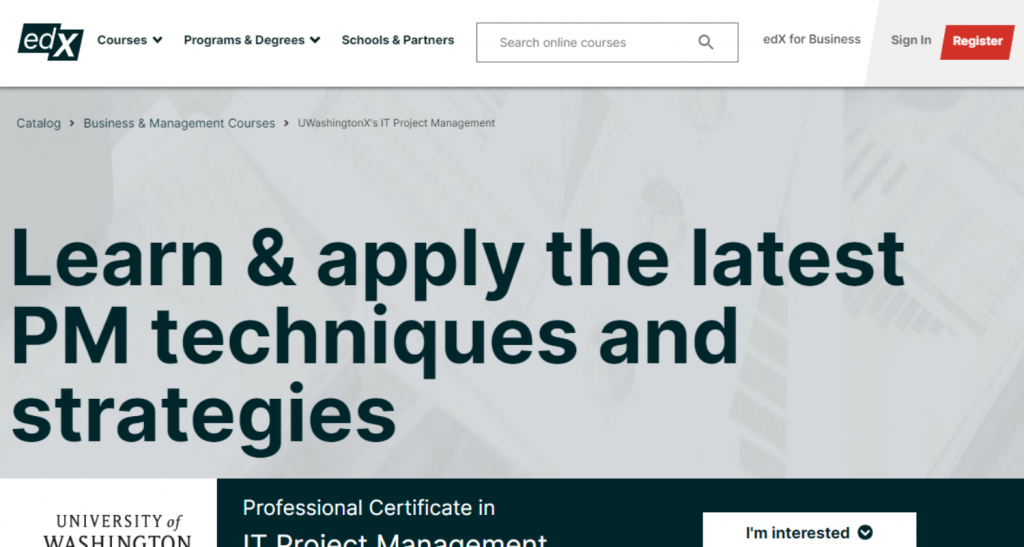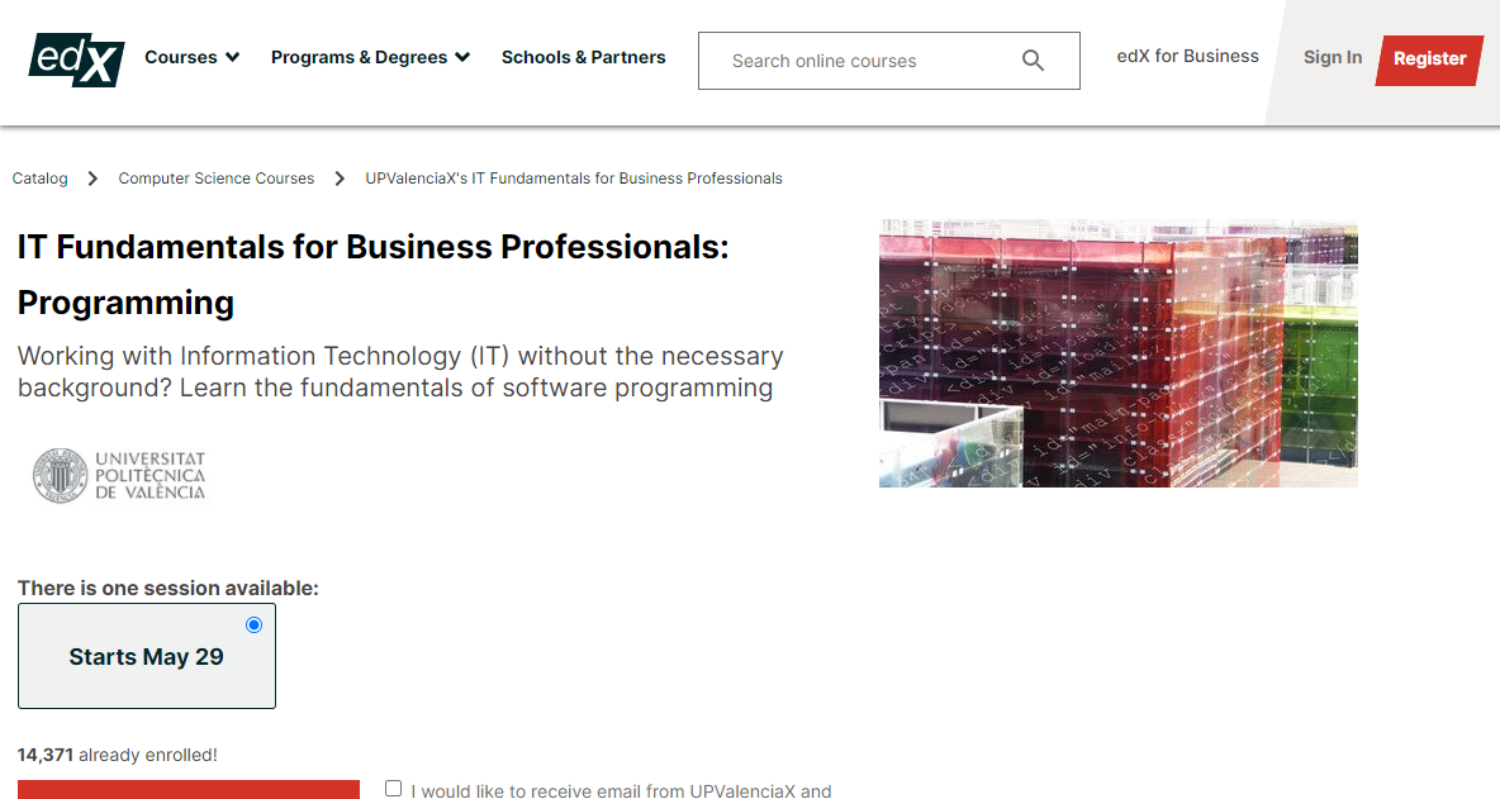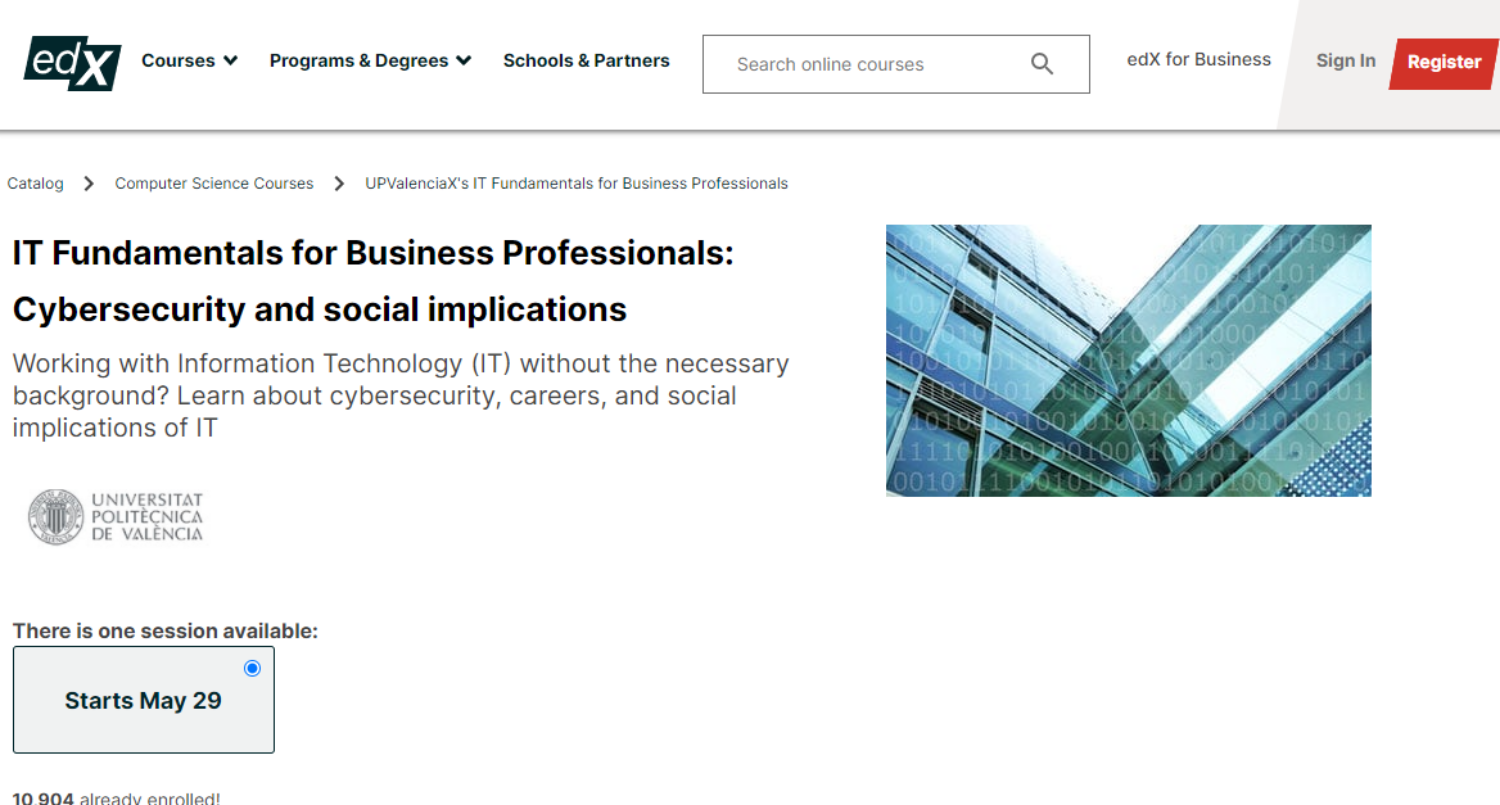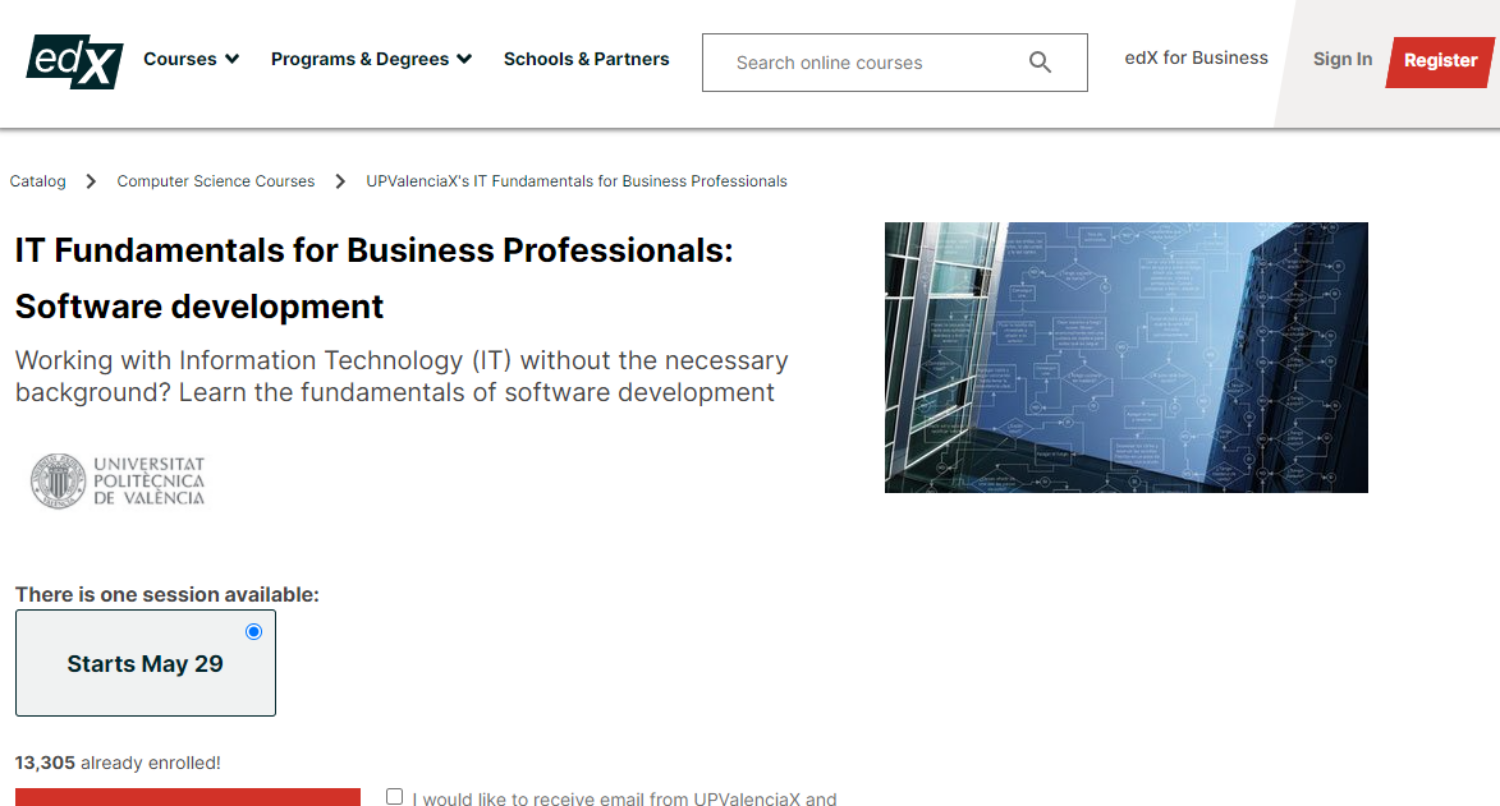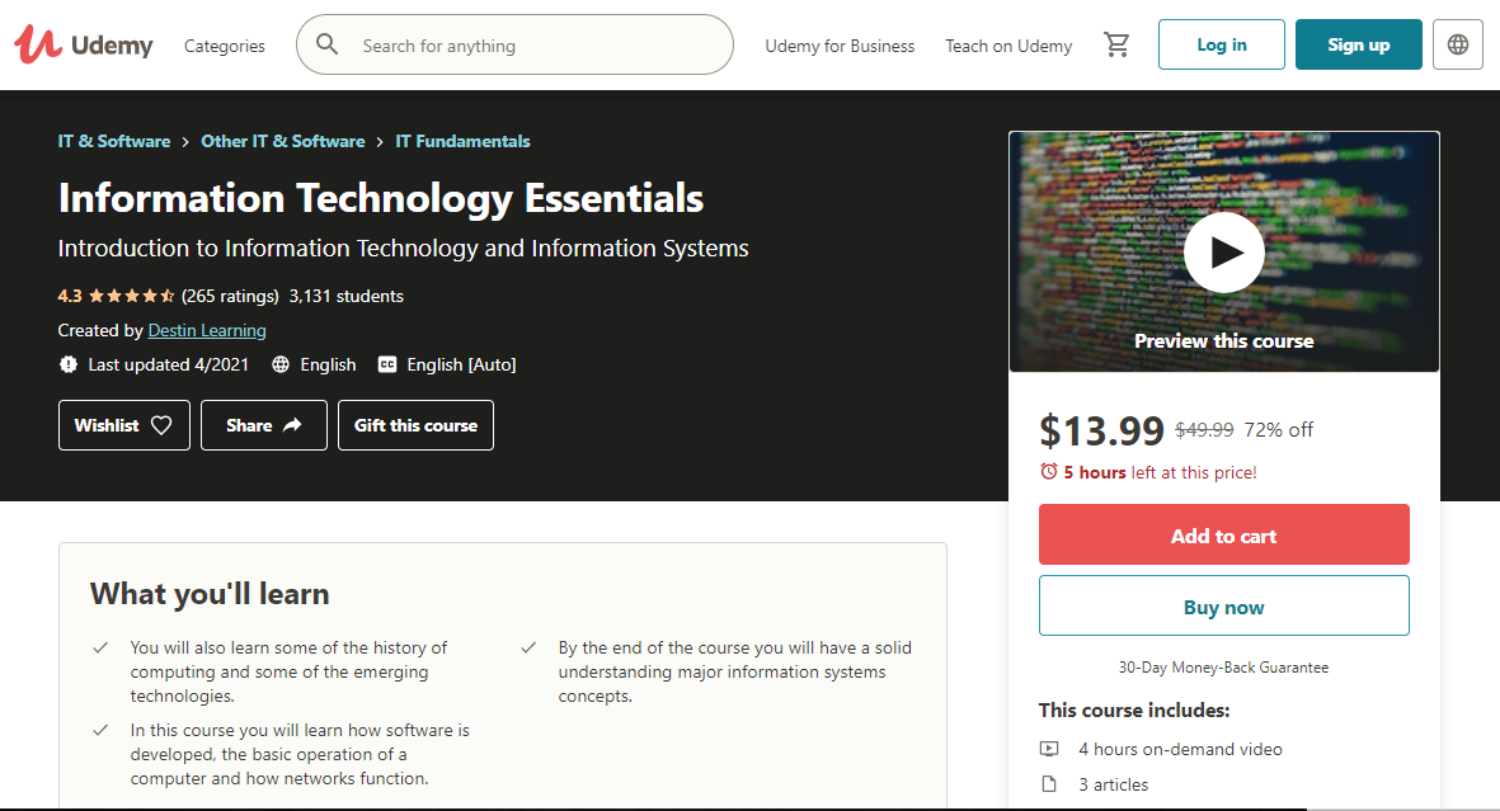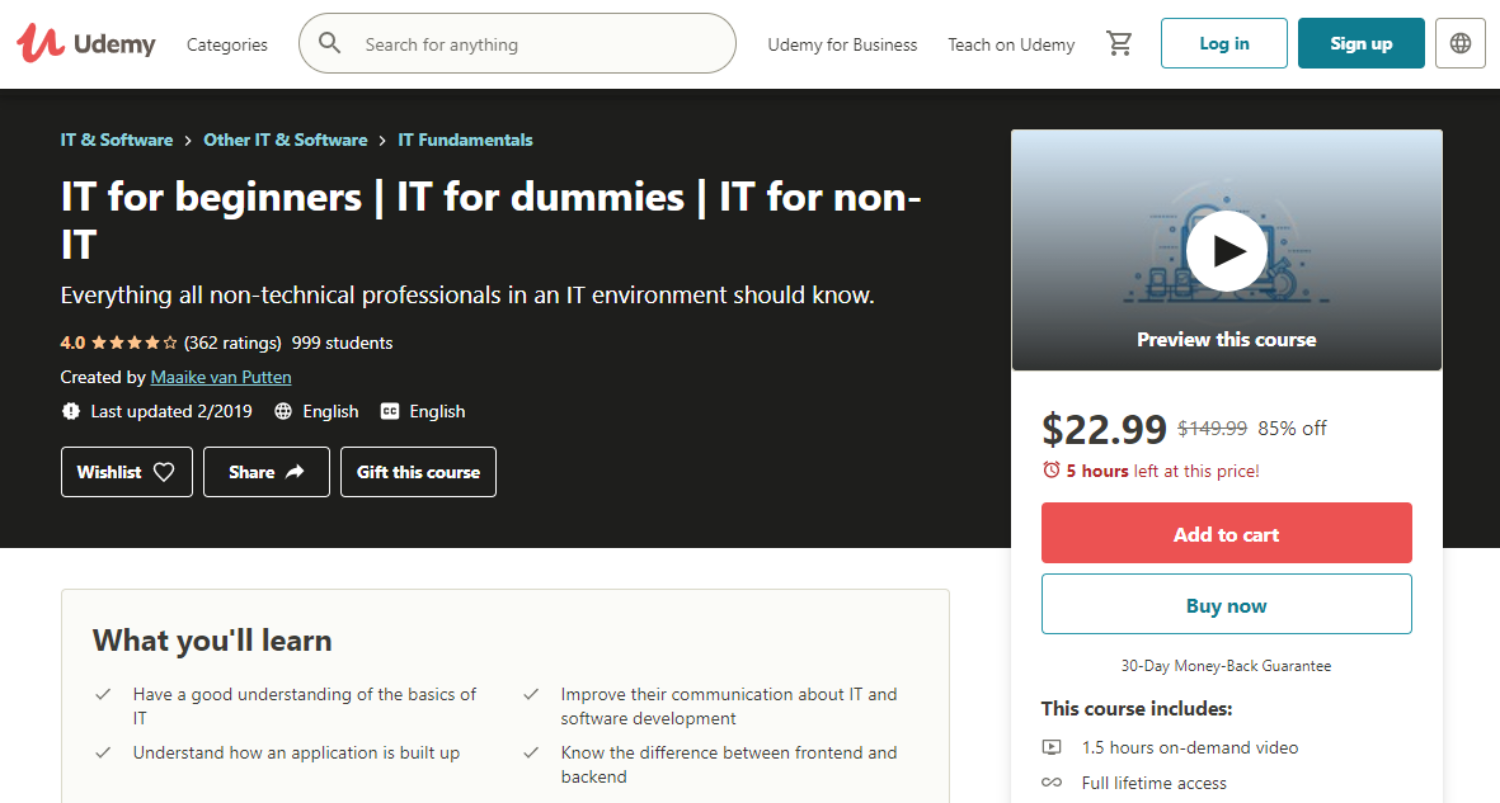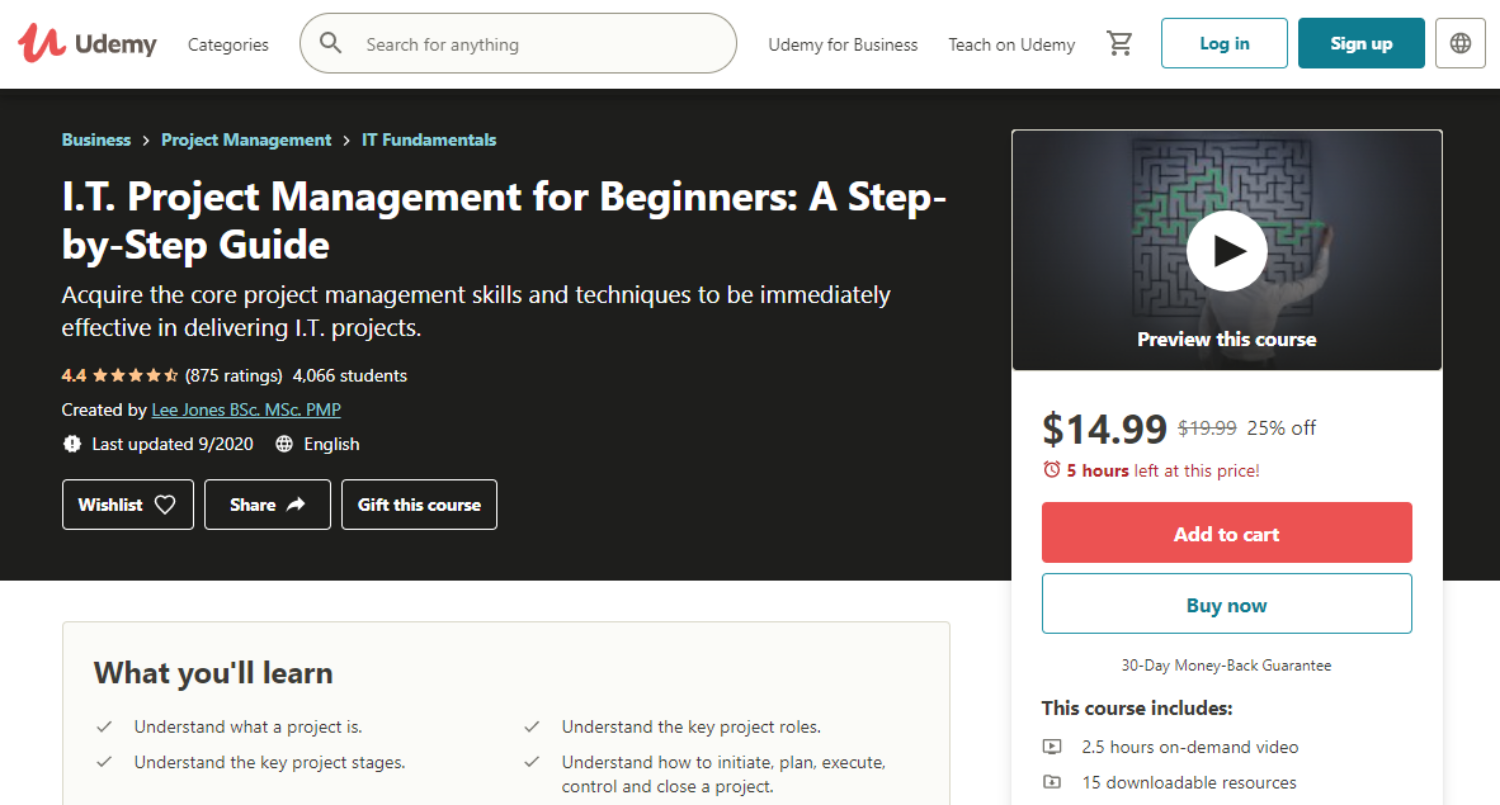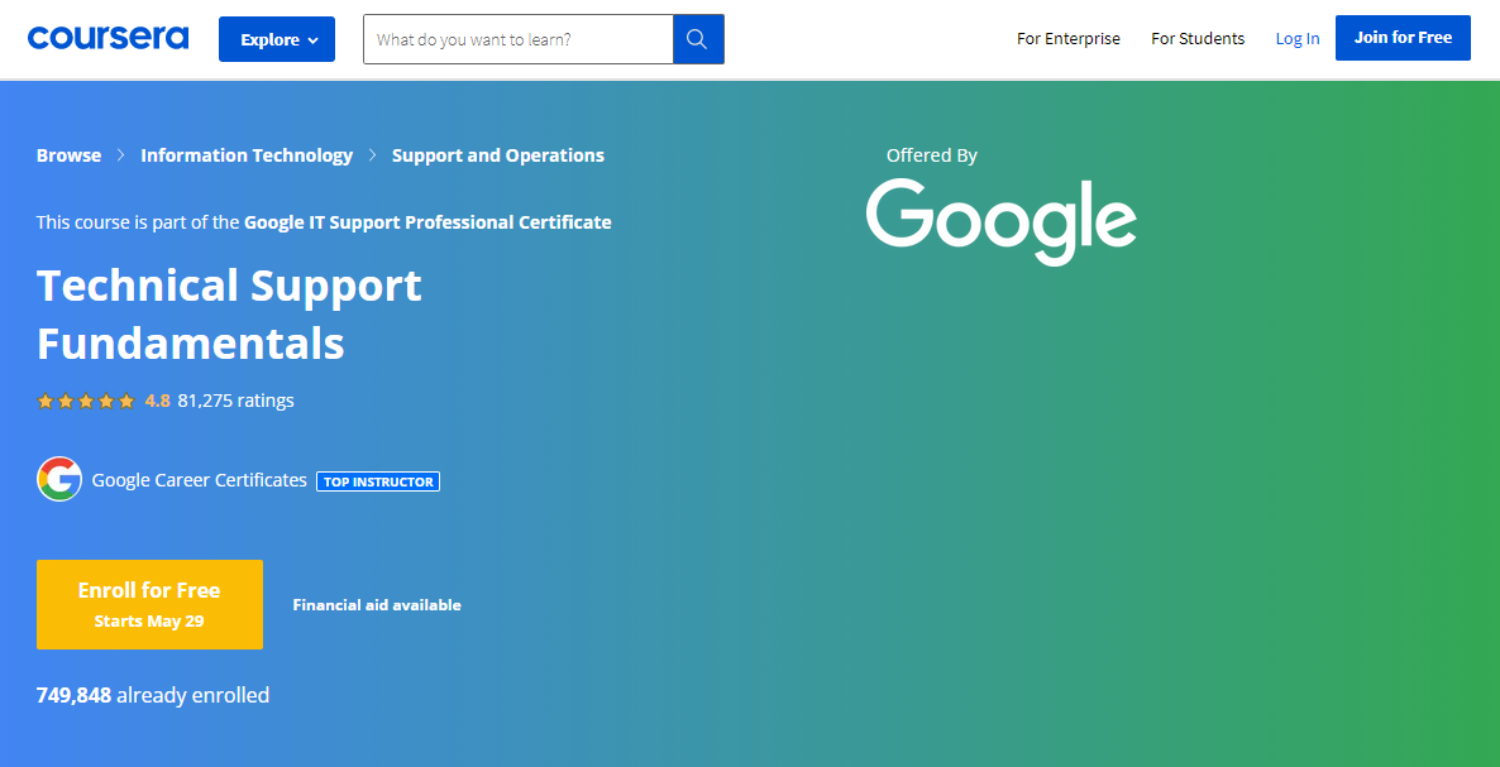Best Information Technology Courses
All topics are curated by you, the community. Free from editorial bias, 100% independent. Upvote your favorite items, propose missing ones and shape the ranking of this topic.
The information technology (IT) industry is one of the fastest-growing industries in the world. As the demand for IT services and products continues to grow, so does the need for qualified IT professionals.
With the right training, you can become one of these qualified IT professionals and secure a well-paying job in this rapidly-growing industry. But with so many different courses and training programs available, it can be difficult to know where to start.
Here are some of the best courses in information technology, to help you decide which one is right for you.
-
Learn & apply the latest PM techniques and strategies
What you will learn:
- Why IT organizations use project management to deliver business value and how organizational culture can influence the role of the PM and individual projects;
- How to describe and distinguish among the major project management methodologies and project lifecycles as applied to IT and to identify strategies for managing distributed teams;
- The purpose of a Project Management Office (PMO), high-level strategies to set up, maintain, and close a PMO, and how it can work within your organization;
- Techniques to intake, prioritize, and select projects and programs so that they align with an organization's overall business strategy; and
- Which personal and performance competencies are necessary for project management in IT, and strategies for developing those skills.
Program overview
Are you an IT professional new to project management or a manager who wants to develop more robust project management skills? Perhaps you are looking to forge a career as a full-time project manager (PM). This program will introduce you to the fundamentals of project management, specifically as they apply to the field of information technology (IT).
This program will help you select project management techniques and strategies that best fit your IT project or organization. You’ll also explore how project management offices are organized and how they develop a project portfolio. Throughout the program, you’ll come to understand some of the challenges of the field, including management of diverse teams and projects that are potentially based anywhere in the world. By the end, you’ll determine your own competencies as an IT project manager and will have developed core skills required for this role.
Courses in this program
UWashingtonX's IT Project Management Professional Certificate
Strategic Applications of IT Project & Program Management
Portfolio Management, Governance, & the PMO
Leadership and Management for PM Practitioners in IT
Article from: https://www.edx.org/professional-certificate/uwashingtonx-it-project-management
-
Working with Information Technology (IT) without the necessary background? Learn the fundamentals of software programming
About this course
This course is one of the 5 courses of an introductory business information systems series, designed to introduce you to the amazing world of Information Technology.
The series of courses is designed so that a professional in a field outside the information technologies (financial, administrative or managerial) acquires the basic knowledge in Information Technology to be able to interact more profitably with the computer and telecommunications specialists of your company or other corporations with which you are related, being able to specify requirements, evaluate workloads and monitor results in a much more effective way.
The syllabus of the series is based on the CLEP Information Systems and Computer Applications exam.
In this course you will learn the basics of software programming. We will address the basic logic behind any computer program, what types and structures of data and files are used, how object-oriented programming works, database management and SQL language and various concepts and guidelines in web development such as HTML, XML, CSS or javascript, among others.
By completing the series of 5 courses, you will be prepared to interact effectively with specialists in the Information Technology sector (and pass the CLEP ISCA exam if you wish).
What you'll learn:
- The syntax and programming structures (pseudo code)
- The logic behind the creation of computer programs
- How Object-Oriented Programming works
- The most important types and data structures
- What are the most common file types
- How databases are managed
- The bases of the SQL language
- What are data warehousing and data mining
- Basics of web technologies (HTML, XML, CSS, javascript)
- Basic design and analysis guidelines in web pages development
Article from: https://www.edx.org/course/it-fundamentals-for-business-professionals-program
-
Working with Information Technology (IT) without the necessary background? Learn about cybersecurity, careers, and social implications of IT
About this course
This course is one of the 5 courses of an introductory business information systems series, designed to introduce you to the amazing world of Information Technology.
The series of courses is designed so that a professional in a field outside the information technologies (financial, administrative or managerial) acquires the basic knowledge in Information Technology to be able to interact more profitably with the computer and telecommunications specialists of your company or other corporations with which you are related, being able to specify requirements, evaluate workloads and monitor results in a much more effective way.
The syllabus of the series is based on the CLEP Information Systems and Computer Applications exam.
In this Computer Science course we will deal with cybersecurity and various other social aspects of ICT, such as its effect on globalization, business strategy and other economic processes, ergonomics, cloud computing and professionalcareers in the field of ICT.
By completing the series of 5 courses, you will be prepared to interact effectively with specialists in the Information Technology sector (and pass the CLEP ISCA exam if you wish).
What you'll learn:
In this course you will learn about:
- The effects of ICT in processes such as globalization, e-commerce, business strategy, competition and outsourcing, among others
- Cybersecurity concepts related to intellectual property, privacy, hackers; threats and how to defend us against them.
- The phenomenon of Web 2.0 and social networks
- The different professional careers that can be chosen in the world of IT
Article from: https://www.edx.org/course/it-fundamentals-for-business-professionals-cyberse
-
Working with Information Technology (IT) without the necessary background? Learn the fundamentals of software development
About this course:
This course is one of the 5 courses of an introductory business information systems series, designed to introduce you to the amazing world of Information Technology.
The series of courses is designed so that a professional in a field outside the information technologies (financial, administrative or managerial) acquires the basic knowledge in Information Technology to be able to interact more profitably with the computer and telecommunications specialists of your company or other corporations with which you are related, being able to specify requirements, evaluate workloads and monitor results in a much more effective way.
The syllabus of the series is based on the CLEP Information Systems and Computer Applications exam.
In this course, you learn the basics of software project management, reviewing basic project management concepts and roles, system development lifecycle, tools and methods used in software development, standards. used in the development and the design of the user interface of a computer system.
By completing the series of 5 courses, you will be prepared to interact effectively with specialists in the Information Technology sector (and pass the CLEP ISCA exam if you wish).
What you'll learn
You will learn about:
- Tools and methods for software development
- Concepts about the life cycle in systems development.
- Roles and functions in the management of software projects
- Different methods for the processing of information (lots, real time ...)
- Design of user interfaces.
- Development and motivation of standards in software.
Article from: https://www.edx.org/course/it-fundamentals-for-business-professionals-softwar
-
Introduction to Information Technology and Information Systems
What you'll learn:
- You will also learn some of the history of computing and some of the emerging technologies.
- By the end of the course you will have a solid understanding major information systems concepts.
- In this course you will learn how software is developed, the basic operation of a computer and how networks function.
- You will also lean the basics of HTML and how websites operate
Requirements:
- This class is an entry level class and assumes no previous knowledge of Computer Science.
Description:
This course is a survey of the critical topics of Information Systems. The material covers essential areas that drive computing and information technology today. I describe these technologies in easy-to-understand terms and use practical examples to illustrate how these concepts are used in everyday IT operations.
The course contains sections that cover a survey of topics of information systems and computer science. These topics include:
- A basic introduction to computer hardware and how a computer functions
- An introduction to foundations concepts such as binary numbers and why they are important in computing
- How software is built by industry today and the software development life cycle (SDLC)
- Basics of database management systems
- Cloud computing and the services that are offered by the leading vendors on the market today, such as Amazon AWS
- Computer security and
- The future of computing
I have designed this course for anyone who wants to learn more about the Information Technology field and is ideal for someone just getting started. Also included is a section for those individuals who desire to start a career in Information Technology and the jobs that are available. The course will give you a solid understanding of many of the concepts that drive one of the most important industries in today's world. I have also included several downloadable materials that you can use to help you along your way with this course.
Who this course is for:
Anyone interested in pursuing a career in information technology.
This class is idea for an entry level Computer Science student.
Article from: https://www.udemy.com/course/information-technology-essentials/
-
Everything all non-technical professionals in an IT environment should know.
What you'll learn:
- Have a good understanding of the basics of IT
- Improve their communication about IT and software development
- Understand how an application is built up
- Know the difference between frontend and backend
- Know when something is a frontend or a backend issue
- Understand databases and have seen some database management systems
- Understand cloud and IoT
- Know what roles there are in the IT field
Requirements
- None, only a laptop, tablet or smartphone
Description
At work they often talk about APIs, frontend, backend, application design and all sorts of technical terms, assuming that you know what this is. And maybe you even do know what this is to manage basic conversations, without truly understanding it (pun intended). Would you like to know more about IT? This course will teach the basic concepts of IT in easy language.
After this course you will:
- Understand the IT landscape
- Know how software is built up
- Have a basic understanding of what code looks like
- Understand the software development process
- Know what roles are common in the software development field
This course if for:
- Anyone with a non-IT background that is working in an IT environment
- Non-technical people that communicate with IT professionals a lot
- Anyone that wants to understand more about the basics of IT
This course is not for:
- People with a lot of IT experience
- People that hope to learn programming in this course (though it is a good course to take before learning how to program)
If there are any topics that you'd like to have discussed as well, or that you want to have more in-depth knowledge of, please let me know and I'd love to add them to this course!
Who this course is for:
- People that need to know more about IT, but have a non-technical or non-IT background
- People that want to explore whether a career switch to IT is interesting for them
Article from: https://www.udemy.com/course/it-for-beginners/
-
Acquire the core project management skills and techniques to be immediately effective in delivering I.T. projects.
What you'll learn:
- Understand what a project is.
- Understand the key project roles.
- Understand the key project stages.
- Understand how to initiate, plan, execute, control and close a project.
- Effortlessly handle risk, issue and change management.
- Learn how to manage and control resources.
- Be immediately effective in your new project management role.
Requirements
- No prerequisite knowledge is required.
Description:
This course will provide you with the essential knowledge and techniques to successfully manage I.T. projects of any size and type. It is ideally suited to those who may be leading a project for the first time and who need to be immediately effective, or current project managers who are looking to maintain their skills and expertise. All project stages are covered, and a pragmatic, step-by-step approach is taken throughout the course in order that you can quickly understand and subsequently utilise core project management concepts.
The course content is based on my own extensive experience in the project management field, and during my career I have used almost every project management method available. As a result, I know what works, and what doesn't work in the real world, and this course covers the essential, proven processes and techniques that will set you on the road to successful project delivery.
Key lectures have associated example templates, documents and processes that can be downloaded, and quizzes are also provided to regularly test your knowledge and understanding as you progress. Subtitles are also available, and can be displayed below the screen to avoid obscuring lecture information. Finally, on successfully finishing the course, you will receive a Certificate of Completion in recognition of your newly-acquired knowledge and skills.
Who this course is for:
- First-time Project Managers who need to be immediately effective.
- Current Project Managers who may want to refresh their knowledge.
-
Boost your IT recruitment with indepth IT knowledge and practical recruitment tips
What you'll learn:
- Amaze your clients and candidates that you speak their language
- Ask technical questions and understand the answers
- Stand out as a recruiter because of your solid IT basic knowledge
- Truly bond with your audience and have long term business relationships
- Have candidates and clients help you bring more business with a basic tactic
- Feel more humanly connected AND make more placements/deals
- Get the Bright Boost Basic Certification (if you pass the exam)
Requirements:
- None
- Knowledge of recruitment will help though
Description
- Do you want to know how to boost your IT recruitment? Let me help you with that!
- After this course, you will:
- Amaze your clients and candidates, because you speak their language with the questions I'll teach you (and yes I will make sure that you understand the answer and have a proper conversation about the topic with confidence)
- Stand out as a recruiter because of your solid software development basic knowledge
- Truly bond with your audience and have long term business relationships
- Have candidates and clients help you bring more business with a basic tactic
- Better connections and more indepth relationships with clients and candidates
- Get the Bright Boost Basic Certification (if you pass the exam)
Prerequisites:
- None
- Knowledge of recruitment will help though
This training is for:
- Recruitment / HR / talent management professionals
- People that would love to get a better understanding about software development
This training is not meant for:
- Software developers
- People that want to learn how to code
- Anyone who has a basic understanding of software development already
Based on my previous experience I am confident enough to say that having better understanding of the market you are operating in, will get you higher results, because you will step up your IT recruitment game with your IT knowledge.
If you are taking this course and there is anything in particular missing, please reach out! I love to hear from you how I can help you even better.
Who this course is for:
- Recruiters
- Sales professionals
- People with a non-technical background that would like to learn something about software development
- NOT software developers and also NOT people who would like to learn how to code
Article from: https://www.udemy.com/course/it-for-recruiters/
-
This course is part of the Google IT Support Professional Certificate
About this Course
This course is the first of a series that aims to prepare you for a role as an entry-level IT Support Specialist. In this course, you’ll be introduced to the world of Information Technology, or IT. You’ll learn about the different facets of Information Technology, like computer hardware, the Internet, computer software, troubleshooting, and customer service. This course covers a wide variety of topics in IT that are designed to give you an overview of what’s to come in this certificate program.
By the end of this course, you’ll be able to:
- understand how the binary system works
- assemble a computer from scratch
- choose and install an operating system on a computer
- understand what the Internet is, how it works, and the impact it has in the modern world
- learn how applications are created and how they work under the hood of a computer
- utilize common problem-solving methodologies and soft skills in an Information Technology setting
Article from: https://www.coursera.org/learn/technical-support-fundamentals
